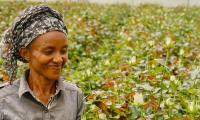Climate

Structurally oppressed groups and minorities, for example women, indigenous people, or LGBT+ people, are generally hit harder by the climate crisis than the majority and structurally included groups of people. This is of course not because the climate discriminates against certain population groups, but because the climate crisis acts as a magnifying glass that exacerbates the inequalities that already exist in a society.
It is therefore important to focus on inequality and other forms of structural oppression across, for exam-ple, gender, age, ethnicity, sexual orientation, gender identity, disability, and socio-economic status. Be-cause a more equal society is more resistant to climate change and can better adapt to it. But we do not achieve equality in a society without the fulfilment of sexual and reproductive health and rights (SRHR).
Why does DFPA work with climate?
At DFPA, our vision is a world where sexual and reproductive health and rights are recognised and re-spected and this is what we work towards every day. Climate change hampers this work because people's SRHR are challenged when they live in places affected by climate change. But at the same time, SRHR is an important component for societies and individuals to be more resilient towards climate change and to be better able to adapt to climate changes because SRHR is a cornerstone of equality. Therefore, the climate agenda is an important part of DFPA's work.
How does DFPA work with climate?
We work both programmatically and politically within the climate agenda.
We have programmes and projects in countries that are severely affected by climate changes, and through our local partners we implement projects that are designed to address the linkages between SRHR and climate adaptation.
We work politically by advocating for the importance of talking about SRHR when talking about climate change; both because climate change harms SRHR, but also because the fulfilment of SRHR is crucial for local communities’ resilience and adaptive capabilities to climate changes.
A rights-based approach to climate work
Both our political and programmatic work is based on a human rights-based approach. This means that we always defend human rights, which includes SRHR and the right to one's own body, gender, and sexuality.
Therefore, DFPA actively opposes the use of SRHR, including access to contraception, family planning and education for women and girls, as a solution to the climate crisis or a climate mitigation strategy. Firstly, we oppose this narrative because there currently is no evidence linking individuals in countries with higher fertility rates to having higher levels of greenhouse gas emissions – quite the opposite in fact. All current evidence suggests that the per capita emissions in countries with higher fertility rates are almost non-existent compared to the per capita emissions in countries with lower fertility rates. Secondly, we oppose the use of SRHR as a climate mitigation strategy, because it instrumentalises the bodies of women and girls, and places the responsibility for the climate crisis on people who are least responsible for creating it, and who at the same time are also those who are affected the most by climate changes. Such strategies thus violate human rights to a great extent, including sexual and reproductive rights.
It is a narrative that takes the focus away from countries’ responsibility to address the structural causes of the climate crisis and inequality. Thus, DFPA also advocates for climate justice which means that countries must protect the people in the climate crisis and the climate itself in accordance with the country’s historic responsibility for creating the climate crisis and the resources they have available.
Example: This is one way that SRHR and climate are interlinked
- The risk of sexual and gender-based violence increases during humanitarian crises and in times of displacement. Both can be expected to increase as a result of more severe and frequent extreme weather events, but also as a result of the slower onset effects of the climate crisis, such as sea level rise. Child marriages, early marriages and forced marriages are also more likely to occur in times of crisis and displacement.
- When critical infrastructure, such as clinics and roads, are destroyed in extreme weather events, it can prevent people from accessing health services. Even where health services are available and within reach, women, girls, and structurally oppressed groups may be unable to access them due to existing gender (and other) barriers that are reinforced during crisis. Where sexual and reproductive health services are not.
- People living in poverty are hit harder by climate change. This is because they are more dependent on local natural resources and have fewer financial resources to, for example, rebuild property after ex-treme weather events strike. Therefore, when 70% of the world's 1.3 billion people living in poverty are women, it has catastrophic gender inequality consequences when extreme weather events such as droughts or floods strike. Worst case, it can result in extreme poverty and death.
What does resilience and adapting to the climate mean in practice?
Resilience means that when, for example, extreme weather events occur, the consequences for society and individuals are smaller the more resilient the society is.
Strengthening resilience is done through adaptation to climate change – either climate change that is already taking place or those changes that are expected to take place in the future. This can be done, for example, by growing a type of crop that can cope with more extreme weather events. In this way, the harvest is secured and thus also both food and income for the individual person, family, and local community.
Another way to adapt to climate changes and to increase resilience is to promote SRHR and thus equality in societies. Because a more equal society tends to be, among other things, more stable and has a more resilient economy, which is essential to get through (climate) disasters.

